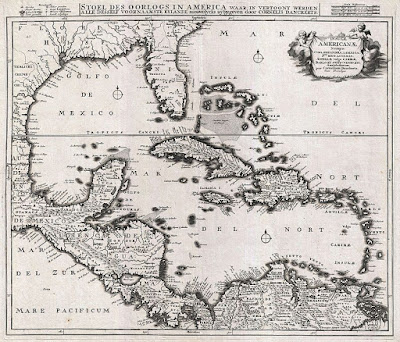Been wanting to run a little like Morrowind, a little like Tekumel, a little like Tartary. Magical realist Latin America if the Reconquista failed and some enterprising Berber made that fateful trip to what would become Hispaniola instead of Columbus. Think City of Saints and Madmen, Deathless, Dictionary of the Khazars, the Etched City, One Hundred Years of Solitude, House of the Spirits, Ficciones, Trickster’s Choice, Mononoke, and Wide Sargasso Sea.
Because I am fascinated by but incapable of novelty, I am stealing Richard’s Countercolonial Heist Crawl rules, and applying a few changes to soothe my trad gamer anxieties.
 |
| New Barbary |
La Habana
The game starts here. The dastardly Castilians of La Florida have parked a flotilla of the coast, ostensibly to await the Emir of La Habana’s response to their treaty proposal but in actuality to violently extract concessions should he refuse. This has proven to be quite a kick to the anthill–the surrounding loose confederacy of caciques, sheikhs, bandits chiefs, and pirate captains who technically owe fealty to the emir are all scrambling to pick sides and ensure they come out on top once the dust settles.
Otra Tetuán
The biggest city in New Barbary, located near the real-life Panama City. Ruled by a cartel of traders and pirates, this is the metropolis where you can buy any good, purchase any service, or find any piece of information you might need.
San Serafín
Ruined nightmare island-city, filled with curses and monsters and treasure.
Hacienda San Cuervo
Lands in Western Cuba held by Ohache, the despicable Dead Man famous for the blood he demands from his tenants, servants, and slaves.
CHARACTER CREATION
Step 1: Determine Ability Scores
Roll 3d6 for Strength, Constitution, Dexterity, Intelligence, Wisdom, Charisma. Only record the modifiers, except for Constitution. The total equals your HP.
Step 2: Traits (Professions, Skills, and Specializations)
- Pick a Profession, like pirate or blacksmith or spirit medium. When you attempt a task that draws on the knowledge of your profession, roll 2D+ability score modifier.
- Pick a Skill, like sailing, melee combat, metalworking, marksmanship, sorcery, charm, or pickpocketing. When you attempt a task that draws on your proficiency of this skill, roll 3D+ability score modifier.
- Pick a Specialization, like seduction (versus the more general “charm” skill), swordsmithing (versus the more general “metalworking” skill), fist fighting (versus the more general “melee combat” skill), or curse-throwing (versus the more general “sorcery” skill). When you attempt a task that draws on your proficiency of this specialization, roll 4D+ability score modifier.
When you attempt to perform a task that does not comfortably fit any trait, roll 1D+ability score modifier.
If all dice in a roll come up 6, you can roll again and add the new result to your initial roll. Keep on doing this every time you get all 6s.
Step 3: Determine Wonder
Roll 3d6. Your Wonder trait has a number of dice equal to the modifier (treat negative modifiers as positive in this case). If the result is one or more, roll on the table below to determine what your Wonder is.
- Cursed to Die Unscrivened Upon The Banks of the Bosporus
- An Unnerving and Green-haired Beauty
- Knows the Secret Language of Spiders
- Receives Letters from the Prince of Monaco
- Tells and Is Told the Truth
- Dreamt of by Nearby Sleepers
- Courted Maniacally but Cannot Fall in Love
- Possessed by a Freakish and Crude Strength
- Served by an Erratic Spirit of Flame and Desire
- Pursued by Storms
- Utters Prophecies in Ancient Greek
- Believes Self to be Reincarnation of the Queen of Sheba
You can use your Wonder like any other trait (so if you are Cursed to Die Unscrivened Upon the Banks of the Bosporus, you can roll it to withstand any other form of impending death). The Referee may occasionally ask you to make a check with your Wonder to see if it comes into play in a certain situation.
Step 4: Determine Gear
Use Richard’s rules.
THE GAME
Teamwork
We are using Richard’s collective action rules. This is mostly important for caciques, sheikhs, captains, chiefs, etc because when your posse is confronting another, you’ll be using this mechanic. This will be handy for brujas and sorcerers, since spirits count as helpers and magical warfare largely relies on how many ghost friends you have made.
Magic
Magic is subtle and specific. Most standard-issue D&D spellcasting, like creating light, throwing fire, or raising the dead is the preserve of spirits and demigods–ignoble humans like PCs might be knowledgeable in the supernatural (what repels types of undead, rituals to prevent a corpse from being raised as a zombi). If they’re very talented, they might be able to change the direction of the wind, give someone nightmares, or bless a couple with fertility. Otherwise, they have to bind or form pacts with spirits, find places of power, or work in concert with many other practitioners.
Combat
Attacker makes a roll with their most relevant trait against the defender’s most relevant trait. If the attacker wins, the defender takes 1d6 – Armor damage (damage die might be higher with particularly effective weapons, but that’s the standard). Attackers can also attempt to disarm, tackle, shove, or make trick shots.
Profession examples
If you want to be handy in a fight:
- bandits
- pirates
- mercenaries
- bouncers
- caravan guards
- veterans
- deserters
- vaqueros
- boxers
- fencer
- knight/faris
- fencers
If you want to be tricksy, knowledgeable, or particularly able to navigate society:
- blacksmith
- student
- aristocrat
- poet
- burglar
- cacique/sheikh
- dancer
- prostitute
- journalist
- mechanic
- pickpocket
- merchant
If you want to be occult, holy, or generally magical:
- bruja/brujo
- spirit medium
- sorcerer/sorceress
- grave digger
- shrine tender
- exorcist
- charm carver
- herbalist
- savant
- oracle/prophet/prophetess
- maskmaker
- monster hunter












